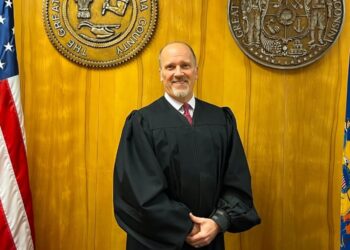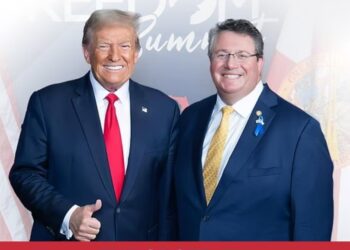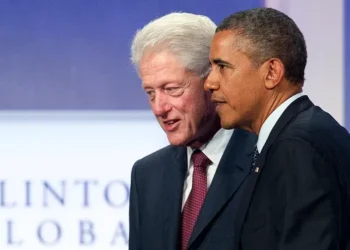The unfolding narrative surrounding a potential criminal conspiracy investigation involving former President Donald J. Trump is multifaceted and contentious. Investigative journalist Julie Kelly, a key commentator, suggests that the case she is focused on now- may ultimately be dismissed on selective or vindictive prosecution grounds. However, as we reported over the weekend, there’s also speculation that pushing the case to trial could expose the alleged misconduct fully, potentially forcing key figures like Jack Smith to confront their actions.
And doing that would take a lot of bravery.
Recent revelations from unsealed court documents, including emails from National Archives and Records Administration (NARA) lawyers, hint at a concerted effort to build a case against Trump. According to court documents, David Ferriero, the archivist, expressed frustration over handling presidential records, indicating a potential motive behind the investigation. This development alone underscores growing concerns about the integrity of the legal process and the possible political motivations behind the case.
However, as we have reported, Speaker Mike Johnson (R-LA) appears to be preventing the case from moving forward for an investigation in the US House.
Many Trump associates have been recognized on the WarRoom for suffering significant repercussions while advocating for a more extensive criminal conspiracy investigation, just as the documents are being deliberated and names of possible abusers are coming out from the case Kelly is talking about.
So while the House drags their feet, the WarRoom keeps on pushing forward.
On Monday’s WarRoom program, former Mayor of New York, Rudy Giuliani, who faced historic death threats from the mafia in his long career, told Steve Bannon that he suspects there is a lot of fear about unraveling this criminal conspiracy against President Trump:
“They’re afraid. I hate to say it. I love Jim [Jordan]but I know they’re afraid. I can look in their eyes. I’ve been doing it a long time, almost 80 years of law and on the streets of Brooklyn being a boxer. I can tell you, they’re scared And they can make it very scary. Steve, you know that,” Giuliani said.
Yet Bannon is relentless in calling for a criminal conspiracy investigation- even a top target of the same type of lawfare, and he adds another layer of complexity. While there are indications of some congressional interest, such as slow rolling from individuals like US Rep. Jordan (R-OH), the hesitancy to bring a criminal case forward raises questions about the political dynamics at play.
Giuliani’s commentary on Bannon’s War Room on Monday further illuminates the challenges and perceived hesitations surrounding the case. Giuliani’s suggestion that Congress may be reluctant to take action due to concerns about the Biden DOJ’s handling of the investigation highlights broader political tensions within the legal system.
As Bannon pointed out on his social media, Axios admits a problem exists. In their article, they show that, in fact, a “cautionary tale” is being set forth in public to frighten people who may try to be brave.
Watch Rudy explain that fear:
"Where Are The Hearings?”: Bannon And Giuliani Calls Out House GOP For Abandoning MAGA And Trump
The national conversation surrounding the potential criminal conspiracy investigation reflects broader societal anxieties and divisions as the nation inches toward the summer when conventions will be held, and third-world-style uprisings are expected.
Accusations of bravery, cowardice, and political motivations underscore the urgent nature of the issue.
Overall, the evolving narrative surrounding the investigation into Trump’s alleged misconduct is fraught with legal, political, and ethical implications. As various stakeholders debate the path forward, the case is a focal point for more extensive discussions about accountability, justice, and the rule of law in contemporary American society.
Critical Bannon post:
— Kari Donovan (@Saorsa1776) April 29, 2024
Critical Kelly Posts:
As I have stated before, it appears that DOJ, NARA, and WH counsel first attempted to concoct a records destruction case against Trump.
New unsealed email from NARA lawyer includes a draft letter to AG Garland from archivist David Ferriero.
This is dated Sept 2021: pic.twitter.com/IE6f5gdSuQ
— Julie Kelly 🇺🇸 (@julie_kelly2) April 28, 2024
There is a chance she dismisses the case based on selective/vindictive prosecution—which she hinted at during a hearing last month. This could be her way of getting as much evidence into the public square to justify such a decision.
Part of me also thinks she wants this to go to… https://t.co/5nuF3lhpt0
— Julie Kelly 🇺🇸 (@julie_kelly2) April 29, 2024
Critical post with Batiromo slamming Jordan for not moving ahead:
— Kari Donovan (@Saorsa1776) April 29, 2024
Consider that Congress CAN investigate
According to attorneys at Mololamen LLC, Congress has a right to investigate and bring criminal charges to the DOJ.
House Committees have the authority to conduct investigations, but their scope and limitations are essential to understand. Here’s what you need to know:
- Broad Investigative Authority:
- Although the Constitution does not explicitly authorize Congress to conduct investigations, both Congress and the courts recognize that Congress has an inherent, constitutional prerogative.
- Congressional investigations serve various purposes, including:
- Legislative function: Gathering information to decide on appropriate legislation.
- National importance: Investigating matters relevant to the nation.
- Oversight: Monitoring federal departments and agencies.
- Congressional committees have broad discretion regarding the scope of their investigations and the relevance of the information they seek.
- Limits on Investigative Authority:
- Private Affairs: Congress cannot generally investigate purely private matters of ordinary citizens.
- Separation of Powers: It cannot usurp the power of other branches of government.
- Judicial Matters: Congress cannot investigate matters where the means of redress is purely judicial.
- Presidential Discretion: Matters committed to the President’s discretion are off-limits.
- Criminal Charges and Investigations:
- While Congress can investigate conduct that may be criminal, it cannot bring criminal charges or initiate prosecutions.
- If a congressional investigation uncovers evidence of criminal activity, Congress may refer the matter to the Department of Justice (DOJ) for investigation and potential prosecution.
- Often, a congressional investigation runs parallel to a DOJ criminal investigation, and evidence from one may be used in the other.
But Congress doesn’t seem to want to take all of the data points that the WarRoom has collected that far.
Remember the cautionary tale
And the fear is real. Flashback to threats that have been made good:
It's really not surprising, especially when Chuck Schumer said that the Intelligence Agencies have six ways to Sunday to go after Trump.pic.twitter.com/ar507vpL6v
— General™️ (@TheGeneral_0) April 20, 2024





![Bannon’s WarRoom, Show Clip Roundup 4/29/2024 [AM]](https://warroom.org/wp-content/uploads/2024/04/e2903f0201e6f43a0dca6052db3b1ebbd6-18-steve-bannon-oval-office.rhorizontal.w610-75x75.webp)